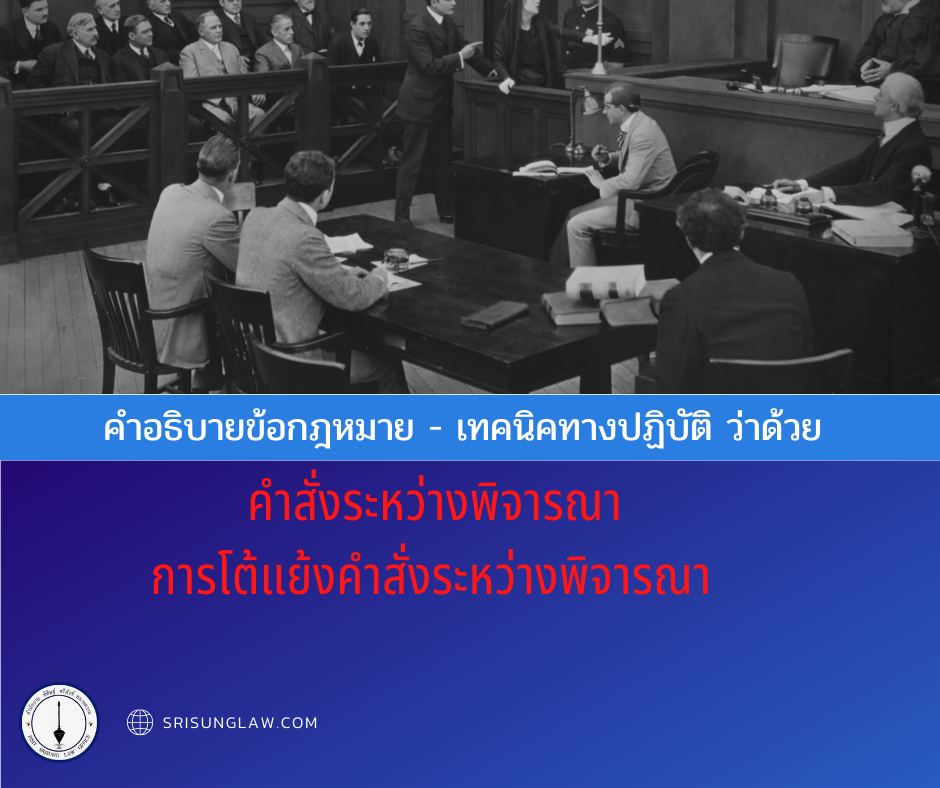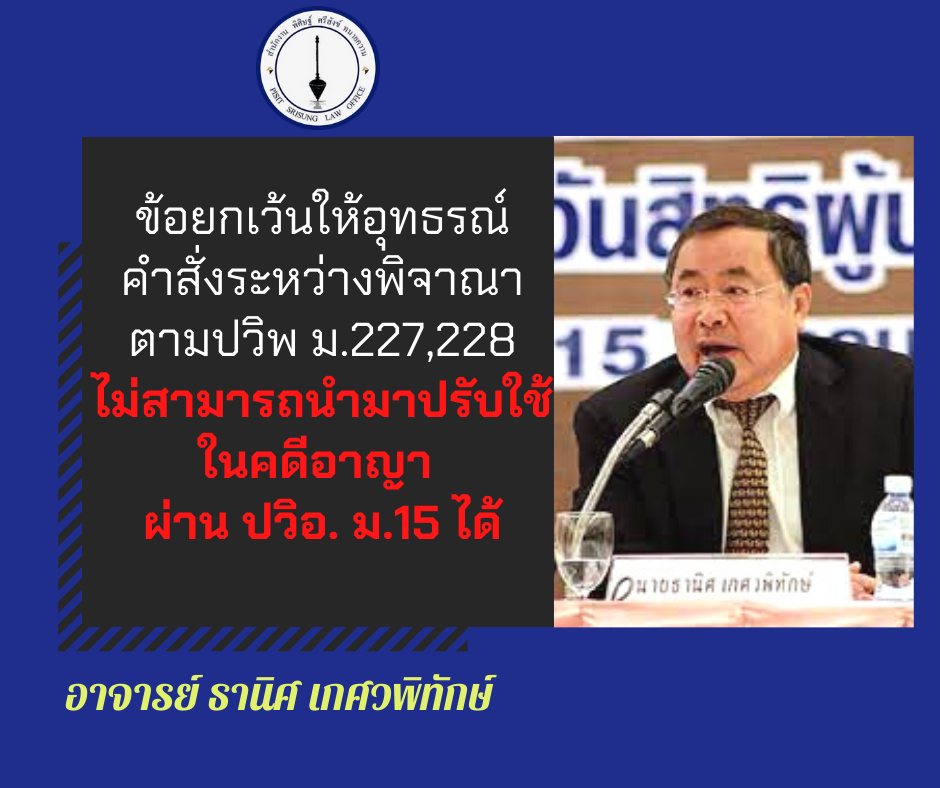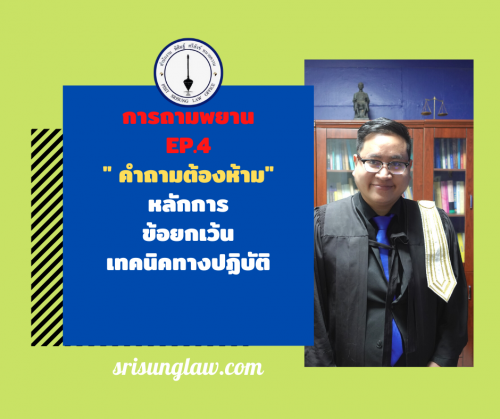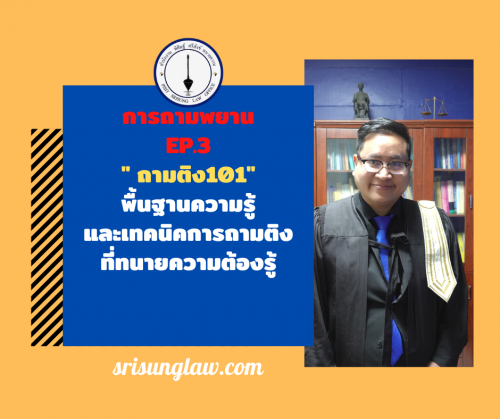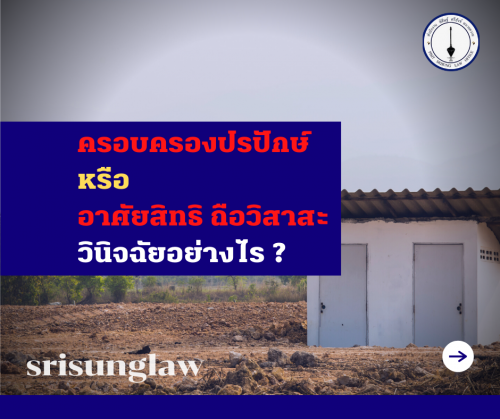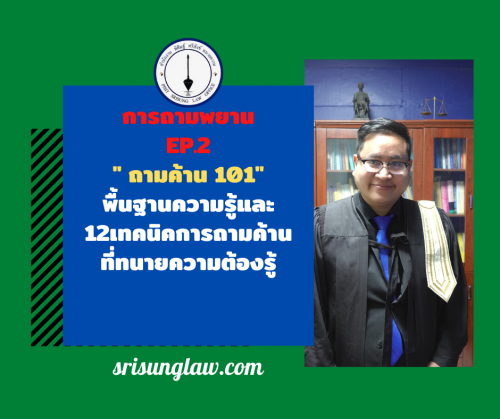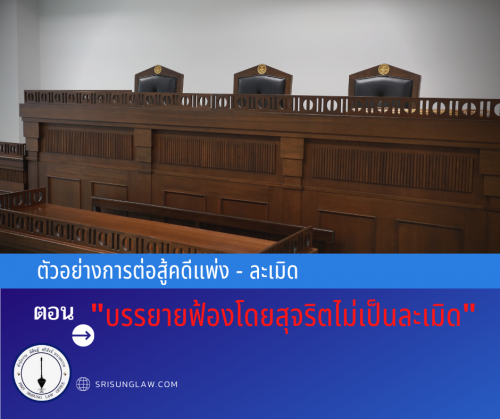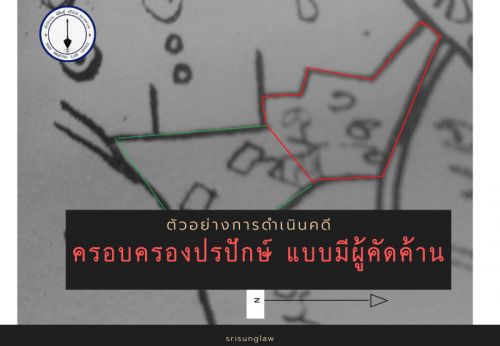คำสั่งระหว่างพิจารณา และ การโต้แย้งคำสั่งระหว่างพิจารณา คือหนึ่งในข้อกฎหมายที่ทนายความจะต้องใช้ในทางปฏิบัติอยู่เป็นประจำ
ซึ่งทนายความจะต้องมีความรู้และความเข้าใจในข้อกฎหมายดังกล่าว ถึงจะสามารถปฏิบัติหน้าที่รักษาผลประโยชน์ของลูกความได้อย่างเต็มที่
ในวันนี้ผมจึงจะมาอธิบายข้อกฎหมาย และเทคนิคทางปฏิบัติที่ควรจะต้องรู้ เพื่อใช้เป็นคู่มือการทำงานต่อไปครับ
คำสั่งระหว่างพิจารณา คืออะไร ?
ตัวบทกฎหมาย
ประมวลกฎหมายวิธีพิจารณาความแพ่ง มาตรา 226
ก่อนศาลชั้นต้นได้มีคำพิพากษาหรือคำสั่งชี้ขาดตัดสินคดี ถ้าศาลนั้นได้มีคำสั่งอย่างใดอย่างหนึ่งนอกจากที่ระบุไว้ในมาตรา 227 และ 228
(1) ห้ามมิให้อุทธรณ์คำสั่งนั้นในระหว่างพิจารณา
(2) ถ้าคู่ความฝ่ายใดโต้แย้งคำสั่งใด ให้ศาลจดข้อโต้แย้งนั้นลงไว้ในรายงานคู่ความที่โต้แย้งชอบที่จะอุทธรณ์คำสั่งนั้นได้ภายในกำหนดหนึ่งเดือนนับแต่วันที่ศาลได้มีคำพิพากษา หรือคำสั่งชี้ขาดตัดสินคดีนั้นเป็นต้นไป
เพื่อประโยชน์แห่งมาตรานี้ ไม่ว่าศาลจะได้มีคำสั่งให้รับคำฟ้องไว้แล้วหรือไม่ ให้ถือว่าคำสั่งอย่างใดอย่างหนึ่งของศาลนับตั้งแต่มีการยื่นคำฟ้องต่อศาลนอกจากที่ระบุไว้ในมาตรา 227 และ 228 เป็นคำสั่งระหว่างพิจารณา
ประมวลกฎหมายวิธีพิจารณาความอาญา มาตรา 196
คำสั่งระหว่างพิจารณาที่ไม่ทำให้คดีเสร็จสำนวน ห้ามมิให้อุทธรณ์คำสั่งนั้นจนกว่าจะมีคำพิพากษา หรือคำสั่งในประเด็นสำคัญ และมีอุทธรณ์คำพิพากษาหรือคำสั่งนั้นด้วย
คำอธิบาย
ระหว่างการดำเนินกระบวนพิจารณาต่างๆของศาล ในคดีแพ่ง หรือคดีอาญา ก่อนที่ศาลจะมีคำพิพากษาตัดสินชี้ขาดให้ฝ่ายใดแพ้หรือชนะคดี ศาลอาจจะมีคำสั่งต่างๆขึ้นมาระหว่างการพิจารณาคดีได้หลายอย่าง ไม่ว่าจะเป็นการสั่งเพราะศาลใช้ดุลพินิจในการสั่งเอง หรือการสั่งตามคำร้องคำขอของคู่ความ
คำสั่งต่างๆเหล่านี้ เรียกว่า “คำสั่งระหว่างพิจารณา”
ตัวอย่างคำสั่งระหว่างพิจารณา เช่น
- คำสั่งอนุญาตหรือไม่อนุญาตให้ยกเว้นค่าธรรมเนียมศาล
- คำสั่งว่าจำเลยขาดนัดยื่นคำให้การ
- คำสั่งไม่อนุญาตให้ถอนฟ้อง
- คำสั่งอนุญาตหรือไม่อนุญาตให้ยื่นบัญชีระบุพยานเพิ่มเติม
- คำสั่งอนุญาตให้คัดถ่ายหรือไม่ให้คัดถ่ายเอกสาร
- คำสั่งอนุญาตหรือไม่อนุญาตให้ออกหมายเรียกพยานวัตถุหรือพยานเอกสาร
- คำสั่งอนุญาตหรือไม่อนุญาตให้เลื่อนคดี
- คำสั่งอนุญาตหรือไม่อนุญาตให้แก้ไขเพิ่มเติมคำฟ้องหรือคำให้การ
- คำสั่งไม่อนุญาตให้โจทก์หรือจำเลยนำพยานเข้าสืบ
- คำสั่งที่ให้เข้ามาเป็นคู่ความแทนผู้มรณะ
ดังนั้นกล่าวโดยสรุปสั้นๆได้ว่า คำสั่งต่างๆของศาล ที่สั่งระหว่างที่ศาลรับฟ้องโจทก์ไว้พิจารณา หรือรับไว้ไต่สวนมูลฟ้อง ไปจนถึงก่อนศาลมีคำพิพากษา ซึ่งคำสั่งดังกล่าวไม่ทำให้คดีเสร็จไปจากศาลทั้งหมดหรือแต่บางส่วน คือ “คำสั่งระหว่างพิจารณา”
นอกจากนี้ถึงแม้ภายหลังศาลมีคำพิพากษาแล้ว ถ้ามีการดำเนินกระบวนพิจารณาขึ้นใหม่ ภายหลังจากนั้น เช่น ขอพิจารณาคดีใหม่ การขอเพิกถอนกระบวนพิจารณาที่ผิดระเบียบ การเพิกถอนการขายทอดตลาด การร้องขอขัดทรัพย์ คำร้องเฉลี่ยทรัพย์ คำร้องขอกันส่วน คำร้องขอเพิกถอนบัญชีรายรับรายจ่ายของเจ้าพนักงานบังคับคดี ฯลฯ
ซึ่งจะต้องมีการไต่สวนคำร้องขึ้นมาใหม่ ก่อนที่จะมีการชี้ขาดเรื่องใหม่นั้น หากศาลมีคำสั่งใดๆขึ้นมาระหว่างการไต่สวนคำร้องก็ถือว่าเป็นคำสั่งระหว่างพิจารณาเช่นเดียวกัน เพราะเป็นคำสั่งก่อนที่ศาลจะมีคำวินิจฉัยชี้ขาดในประเด็นของคดี ตัวอย่างคำพิพากษาศาลฎีกา เช่น 4057/2540 , ฎ.3305/2533
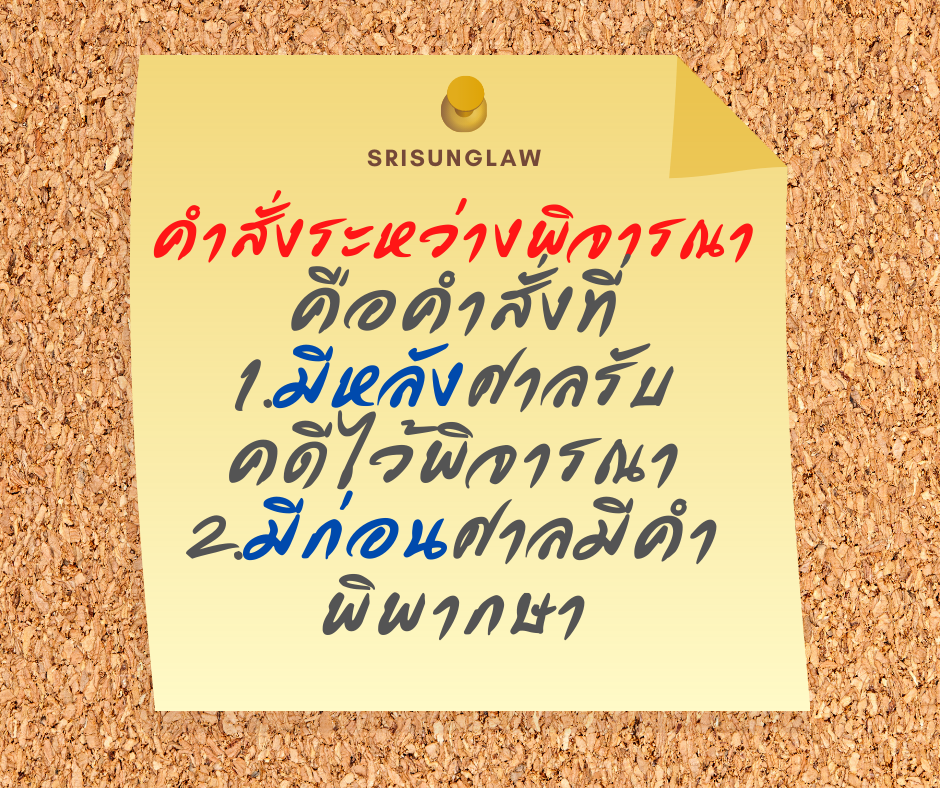
คำสั่งระหว่างพิจารณา อุทธรณ์ได้หรือไม่ ?
คำสั่งระหว่างพิจารณาของศาล หากเป็นการที่ศาลออกคำสั่งโดยไม่ชอบด้วยกฎหมาย ผิดไปจากข้อกฎหมาย สั่งโดยไม่มีอำนาจ หรือโดยฝ่าฝืนต่อกฎหมาย หากคู่ความไม่เห็นพ้องกับคำสั่งนั้น ก็อาจจะขอให้ศาลสั่งเพิกถอนกระบวนพิจารณาที่ผิดระเบียบได้ ตามประมวลกฎหมายวิธีพิจารณาความแพ่งมาตรา 27
แต่ถ้าหากศาลออกคำสั่งระหว่างพิจารณาโดยชอบด้วยกฎหมายแล้ว เพียงแต่อาจจะใช้ดุลพินิจที่ไม่เหมาะสมกับเนื้อเรื่องหรือข้อเท็จจริง หากคู่ความไม่เห็นพ้องด้วยกับดุลพินิจของศาล คู่ความก็สามารถใช้สิทธิอุทธรณ์คำสั่งดังกล่าวเพื่อให้ศาลสูงตรวจสอบกลั่นกรองได้
อย่างไรก็ตาม หากปล่อยให้คู่ความยื่นอุทธรณ์คำสั่งระหว่างพิจารณาคดีได้ทันที ในทุกคำสั่่ง คดีย่อมไม่สามารถดำเนินกระบวนพิจารณาไปโดยสะดวกได้เลย
เพราะเมื่อศาลมีคำสั่งใดๆ คู่ความก็จะอุทธรณ์คำสั่งนั้นเรื่อยไป ทำให้คดีล่าช้าแทบจะไม่มีโอกาสเดินหน้าไปได้เลย และจะเป็นการเปิดช่องให้คู่ความประวิงคดีกันได้โดยง่าย
ตัวอย่างเช่น
ทนายความโจทก์ยื่นคำร้องขอยกเว้นค่าธรรมเนียมศาล ศาลสั่งไม่อนุญาต หากปล่อยให้ ทนายความโจทก์ยื่น อุทธรณ์คำสั่งระหว่างพิจารณาดังกล่าวได้ทันที คดีหลักก็อาจจะไม่คืบหน้า
หรือเมื่อคู่ความยื่นคําร้องคําขอคําแถลงอะไรไป แล้วศาลมีคำสั่งไม่ตรงกับที่ตนเองต้องการและปล่อยให้อุทธรณ์ได้ทันที เช่น เมื่อขอคัดถ่ายเอกสารและศาลไม่ให้ก็อุทธรณ์ได้ทันที ขอหมายเรียกพยานบุคคลหรือพยานเอกสารแล้วศาลไม่ให้ก็อุทธรณ์ได้ทันที
เช่นนี้คดีก็จะไม่มีทางคืบหน้าไปได้เลยเพราะมัวแต่อุทธรณ์คำสั่งเรื่องยิบย่อยกันอยู่เช่นนี้
ดังนั้นแล้วกฎหมาย จึงได้วางหลักไว้ว่า ห้ามไม่ให้คู่ความยื่นอุทธรณ์ คัดค้านคำสั่งระหว่างพิจารณา จนกว่าศาลจะมีคำพิพากษาในเนื้อหาหลักของคดี ทั้งในคดีแพ่งและคดีอาญา (ป.วิ.อ.มาตรา196 และ ป.วิ.พ.มาตรา 226)
ดังนั้นจึงกล่าวโดยสรุปได้ว่า คำสั่งระหว่างพิจารณา ทั้งในคดีแพ่งและคดีอาญา สามารถยื่นอุทธรณ์ได้ แต่จะต้องยื่นอุทธรณ์คำสั่ง ภายหลังจากที่ศาลมีคำพิพากษาชี้ขาดในเนื้อหาแห่งคดีแล้วเท่านั้น
ซึ่งในคดีแพ่งนั้น คู่ความสามารถอุทธรณ์คำสั่งระหว่างพิจารณาโดยลำพังได้ โดยไม่จำเป็นจะต้องยื่นอุทธรณ์คัดค้านคำพิพากษามาด้้วย
แต่ในคดีอาญานั้น การอุทธรณ์คัดค้านคำสั่งระหว่างพิจารณาในคดีอาญา จะต้องมีการอุทธรณ์คัดค้านคำพิพากษามาด้วยเสมอ
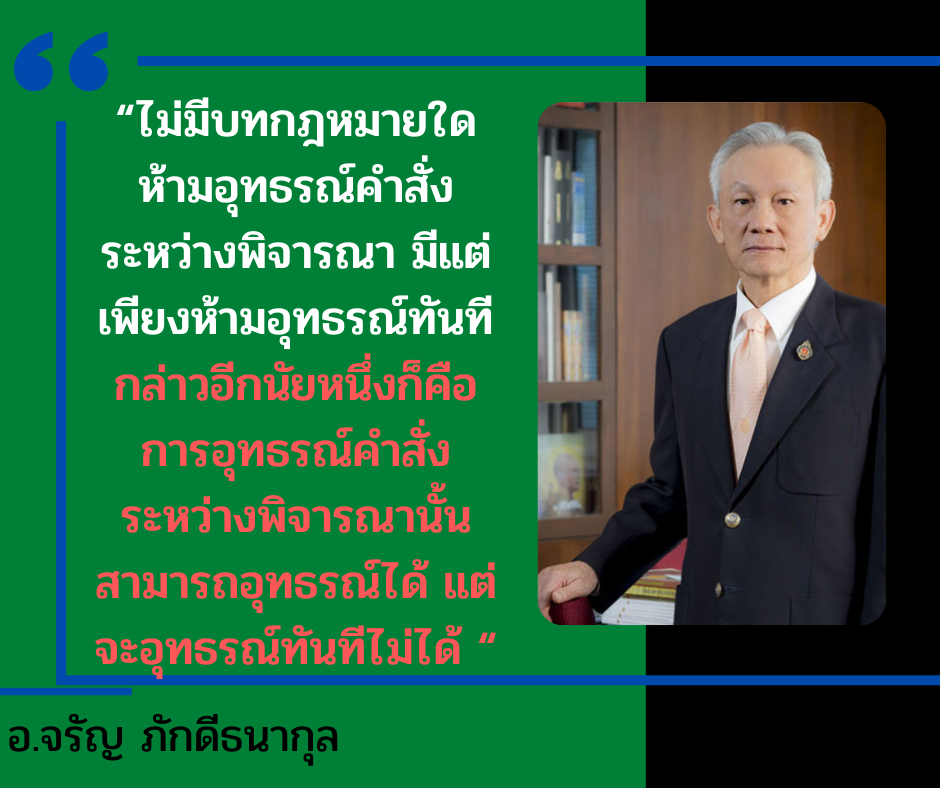
คำสั่งระหว่างพิจารณา ที่สามารถอุทธรณ์ได้ทันที
อย่างที่กล่าวไปแล้วว่าคำสั่งระหว่างพิจารณานั้นโดยหลักไม่สามารถยื่นอุทธรณ์ได้ทันที แต่จะต้องรอให้ศาลมีคำพิพากษาในเนื้อหาคดีเสียก่อนจึงจะสามารถอุทธรณ์คำสั่งระหว่างพิจารณาได้
แต่เฉพาะในคดีแพ่งนั้นยังมีข้อยกเว้น ให้คู่ความอุทธรณ์คัดค้านคำสั่งระหว่างพิจารณาบางประเภทได้ กล่าวคือ
1.คำสั่งที่ทำให้คดีเสร็จไปทั้งสำนวน
ตัวบทกฎหมาย
ประมวลกฎหมายวิธีพิจารณาความแพ่งมาตรา 227 คำสั่งของศาลชั้นต้นที่ไม่รับหรือให้คืนคำคู่ความตามมาตรา 18 หรือคำสั่งวินิจฉัยชี้ขาดเบื้องต้นตามมาตรา 24 ซึ่งทำให้คดีเสร็จไปทั้งเรื่องนั้น มิให้ถือว่าเป็นคำสั่งในระหว่างพิจารณา และให้อยู่ภายในข้อบังคับของการอุทธรณ์คำพิพากษาหรือคำสั่งชี้ขาดตัดสินคดี
คำอธิบาย
ในกรณีที่คำสั่งที่เกิดขึ้นระหว่างพิจารณานั้น ทำให้คดีสิ้นสุดลงไปเลย ไม่มีกระบวนพิจารณาใดๆเกิดขึ้นต่อไปอีก เช่น
1.1 คำสั่งไม่รับหรือคืนคำคู่ความ ตามประมวลกฎหมายวิธีพิจารณาความแพ่งมาตรา 18
คำคู่ความ หมายถึง บรรดาคำฟ้อง คำให้การหรือคำร้องทั้งหลายที่ยื่นต่อศาลเพื่อตั้งประเด็นระหว่างคู่ความ (ปวิพ ม.1 (5)
ในกรณีที่ศาลสั่งไม่รับคำฟ้อง ไม่รับฟ้องแย้ง หรือไม่รับคำคู่ความ และคำร้องทั้งหลายที่เป็นการตั้งประเด็นระหว่างคู่ความตามย่อมทำให้คดีเสร็จไปทั้งเรื่อง เช่นนี้ไม่ถือว่าเป็นคำสั่งระหว่างพิจารณา คู่ความอุทธรณ์ได้ทันที
แต่คำสั่งที่ให้รับคำสั่ง รับคำให้การ อนุญาตให้แก้ฟ้อง อนุญาตให้แก้คำให้การ หรือคำสั่งในทำนองว่าให้โจทก์เสียค่าธรรมเนียมศาลให้ครบถ้วนหรือให้แก้ไขคำฟ้องให้ถูกต้องเสียก่อน ไม่ถือว่าเป็นคำสั่งที่ทำให้คดีเสร็จสำนวนแต่อย่างใด
ตัวอย่างคำพิพากษาศาลฎีกา ฎ.421/2518 , ฎ.2631/2521 , ฎ.9219/2547 , ฎ.421/2518 , ฎ.5882/2541 , ฎ.258/2524 ,ฎ.13302-13303/2558
นอกจากนี้หากมีการร้องสอดเข้ามาในคดีตามประมวลกฎหมายวิธีพิจารณาความแพ่งมาตรา 57 อนุมาตรา 1 หรือ 2 กรณีบุคคลภายนอกยื่นคำร้องสอดเข้ามาเอง คำร้องสอดของบุคคลภายนอกเช่นนี้เป็นคำฟ้องและเป็นคำคู่ความ
ถ้าศาลไม่อนุญาตให้เข้ามาในคดีย่อมมีผลเป็นการไม่รับคำคู่ความ ซึ่งผู้ร้องสอดสามารถอุทธรณ์ได้ทันที ไม่เป็นคำสั่งระหว่างพิจารณา เพราะทำให้คดีในส่วนของผู้ร้องสอดเสร็จสำนวนไป ฎ.1226/2510 , ฎ.5018/2555
แต่ในกรณีที่คู่ความในคดีเช่นโจทก์หรือจำเลยได้ยื่นคำร้องขอให้เรียกบุคคลภายนอกเข้ามาในคดีตามประมวลกฎหมายวิธีพิจารณาความแพ่งมาตรา 57 อนุมาตรา 3
คำร้องขอให้เรียกบุคคลภายนอกเข้ามาในคดีนั้น ไม่ถือว่าเป็นความคู่ความ เป็นเพียงคำร้องแบบนึงเท่านั้น ดังนั้นหากศาลสั่งยกคำร้อง ก็ไม่ถือว่าเป็นคำสั่งไม่รับคำคู่ความ คู่ความอุทธรณ์ทันทีเลยไม่ได้ ฎ.1382/2546 , ฎ.7341/2548 , ฎ.1474-1476/2558
1.2 คำสั่งวินิจฉัยชี้ขาดเบื้องต้นตามประมวลกฎหมายวิธีความแพ่งมาตรา 24
การขอให้ศาลวินิจฉัยชี้ขาดเบื้องต้นตามประมวลกฎหมายวิธีพิจารณาความแพ่งมาตรา 24 คือการขอให้ศาลมีคำสั่ง ให้ฝ่ายตนเองเป็นฝ่ายชนะคดีโดยไม่ต้องมีการสืบพยานต่อไป ซึ่งถ้าหากศาลเห็นสมควรตามคำร้องขอวิชาที่ขาดข้อกฎหมายศาลจะสามารถสั่งให้เราชนะคดีได้เลย ซึ่งคำสั่งประเภทนี้ไม่ใช่คำสั่งระหว่างพิจารณา เพราะทำให้คดีเสร็จจากศาลไปเลยไม่ต้องมีการดำเนินกระบวนพิจารณาใดๆอีกต่อไป
แต่เฉพาะเป็นประเภทคำสั่งวินิจฉัยชี้ขาดเบื้องต้น ที่ให้เป็นคุณแก่ฝ่ายผู้ขอ ให้ฝ่ายผู้ขอเป็นฝ่ายชนะคดีโดยไม่ต้องสืบพยานเลยเท่านั้นถึงจะสามารถอุทธรณ์ฎีกาได้ หากเป็นคำสั่งยกคำร้องหรือให้รอไว้วินิจฉัยในผลคำพิพากษาเช่นนี้ไม่ถือว่าเป็นคำสั่ง ที่ทำให้คดีเสร็จไปทั้งเรื่อง
ฎ.1286/2513 , ฎ.946/2536 , ฎ.2158/2537 , ฎ.2012/2542 , ฎ.1420/2543
คำสั่งประเภทนี้ทำให้คดีเสร็จไปทั้งเรื่อง คดีสิ้นสุดลงโดยไม่มีกระบวนพิจารณาใดๆอีกต่อไป และศาลไม่จำเป็นจะต้องทำคำพิพากษาอีกต่อไปเพราะคดีเสร็จสิ้นลงแล้ว
ดังนั้นคำสั่งประเภทนี้จึงไม่ถือว่าเป็นคำสั่งระหว่างพิจารณาโดยสภาพ และคู่ความสามารถอุทธรณ์ฎีกาคัดค้านคำสั่งดังกล่าวได้ทันที
2.คำสั่งระหว่างพิจารณาแบบพิเศษ
ตัวบทกฎหมาย
ประมวลกฎหมายวิธีพิจารณาความแพ่งมาตรา 228
ก่อนศาลชี้ขาดตัดสินคดี ถ้าศาลมีคำสั่งอย่างใดอย่างหนึ่งดังต่อไปนี้ คือ
(๑) ให้กักขัง หรือปรับไหม หรือจำขัง ผู้ใด ตามประมวลกฎหมายนี้
(๒) มีคำสั่งอันเกี่ยวด้วยคำขอเพื่อคุ้มครองประโยชน์ของคู่ความในระหว่างการพิจารณา หรือมีคำสั่งอันเกี่ยวด้วยคำขอเพื่อจะบังคับคดีตามคำพิพากษาต่อไป หรือ
(๓) ไม่รับหรือคืนคำคู่ความตามมาตรา 18 หรือวินิจฉัยชี้ขาดเบื้องต้นตามมาตรา 24 ซึ่งมิได้ทำให้คดีเสร็จไปทั้งเรื่อง หากเสร็จไปเฉพาะแต่ประเด็นบางข้อ
คำสั่งเช่นว่านี้ คู่ความย่อมอุทธรณ์ได้ภายในกำหนดหนึ่งเดือน นับแต่วันมีคำสั่งเป็นต้นไป
แม้ถึงว่าจะมีอุทธรณ์ในระหว่างพิจารณา ให้ศาลดำเนินคดีต่อไป และมีคำพิพากษาหรือคำสั่งชี้ขาดตัดสินคดีนั้น แต่ถ้าในระหว่างพิจารณา คู่ความอุทธรณ์คำสั่งชนิดที่ระบุไว้ในอนุมาตรา (๓) ถ้าศาลอุทธรณ์เห็นว่า การกลับหรือแก้ไขคำสั่งที่คู่ความอุทธรณ์นั้น จะเป็นการวินิจฉัยชี้ขาดคดี หรือวินิจฉัยชี้ขาดประเด็นข้อใดที่ศาลล่างมิได้วินิจฉัยไว้ ให้ศาลอุทธรณ์มีอำนาจทำคำสั่งให้ศาลล่างงดการพิจารณาไว้ในระหว่างอุทธรณ์ หรืองดการวินิจฉัยคดีไว้จนกว่าศาลอุทธรณ์จะได้วินิจฉัยชี้ขาดอุทธรณ์นั้น
ถ้าคู่ความมิได้อุทธรณ์คำสั่งในระหว่างพิจารณาตามที่บัญญัติไว้ในมาตรานี้ ก็ให้อุทธรณ์ได้ในเมื่อศาลพิพากษาคดีแล้วตามความในมาตรา ๒๒๓
คำอธิบาย
คำสั่งที่เกิดขึ้นระหว่างพิจารณาบางประเภทนั้น ถึงแม้จะไม่ทำให้คดีเสร็จสิ้นไปทั้งสำนวน และศาลจะต้องดำเนินกระบวนพิจารณาส่วนที่เหลือต่อไปและมีคำพิพากษาในภายหลัง
แต่กฎหมายเพ่งเล็งว่า คำสั่งดังกล่าวอาจจะมีผลกระทบอย่างร้ายแรงต่อคู่ความ ยากที่จะเยียวยาในภายหลัง หรือ อาจจะส่งผลกระทบต่อกระบวนพิจารณาภายหลังทั้งคดี
เช่น คำสั่งให้กักขัง หรือจำขัง บุคคลใด ที่หากปล่อยเนิ่นช้าไปก็อาจจะเกิดความเสียหายแก่บุคคลนั้นเป็นอย่างมาก เส้นคำสั่งให้ลงโทษจำคุกหรือกักขังจำเลยฐานละเมิดอำนาจศาล ฎ.2083/2543
คำสั่งเกี่ยวด้วยการขอคุ้มครองชั่วคราวระหว่างการพิจารณา หรือคำสั่งเกี่ยวด้วยคำขอเพื่อจะบังคับคดีตามคำพิพากษา ที่หากปล่อยเนิ่นช้าไปก็จะเกิดความเสียหายแก่คู่ความทุกฝ่าย เพราะอาจจะเกิดความเสียหายเพิ่มเติมขึ้นมาระหว่างนั้น 1106/2530
หรือคำสั่งไม่รับหรือคืนคำคู่ความหรือวิชาชีพขาดเบื้องต้นตามปวิแพ่งมาตรา 24 ที่ถึงแม้ จะไม่ทำให้คดีเสร็จไปทั้งเรื่อง แต่ก็อาจจะทำให้การตั้งประเด็นหรือรูปเรื่องผิดไปทั้งหมดซึ่งอาจจะส่งผลกระทบต่อคดีทั้งคดี ตัวอย่างเช่น คำสั่งไม่อนุญาตให้แก้ไขคำฟ้องหรือคำให้การดังนั้นกฎหมายจึงเปิดโอกาสให้คู่ความอุทธรณ์คำสั่งระหว่างพิจารณาดังกล่าวได้ทันที โดยไม่ต้องรอศาลมีคำพิพากษาในภายหลัง ฎ.1488/2529 ,ฎ.1936/2530 ,ฎ.9117/2538 , ฎ.1012-1013/2505 ,ฎ.806/2554
ในคดีแพ่งคำสั่งต่างๆดังกล่าวทั้งสองประเภทตามปวิพ. มาตรา 227-228 ถือว่าเป็นข้อยกเว้นพิเศษ ที่ให้คู่ความสามารถอุทธรณ์ได้ทันทีภายในกำหนด 1 เดือนนับแต่ที่ศาลมีคำสั่ง ตามประมวลกฎหมายวิธีพิจารณาความแพ่งมาตรา 223โดยไม่ต้องรอให้ศาลชั้นต้นมีคำพิพากษาเสียก่อนจึงจะยื่นอุทธรณ์ได้ เหมือนคำสั่งระหว่างพิจารณาประเภทปกติ
แต่ข้อยกเว้นดังกล่าว เป็นข้อยกเว้นพิเศษเฉพาะในคดีแพ่งเท่านั้น และไม่สามารถนำมาปรับใช้ในคดีอาญาได้
เพราะคดีอาญานั้น ถือเป็นข้อห้ามเด็ดขาดที่ไม่ให้คู่ความอุทธรณ์คัดค้านคำสั่งระหว่างพิจารณาที่ไม่ทำให้คดีเสร็จสำนวนในทุกกรณี
ทั้งนี้ สาเหตุที่คดีอาญาจะต้องต้องห้ามโดยเด็ดขาดนั้น เนื่องจากคดีอาญาจะต้องมุ่งเน้นการดำเนินกระบวนพิจารณาให้รวดเร็ว เพราะมีอิสรภาพของจำเลยเป็นเดิมพันอยู่ระหว่างพิจารณา
หากปล่อยให้อุทธรณ์คำสั่งระหว่างพิจารณาได้ จำเลยอาจจะต้องถูกคุมขังระหว่างพิจารณานานขึ้นกว่าเดิม ดังนั้นในคดีอาญาจึงไม่อาจอุทธรณ์คำสั่งระหว่างพิจารณาได้เลย
อย่างไรก็ตามในกรณีคำร้องขอเข้าเป็นโจทก์ร่วมของผู้เสียหายนั้น หากศาลยกคำร้องขอเข้าเป็นโจทก์ร่วมของผู้เสียหาย ศาลฎีกาตีความไปในทำนองว่า เป็นคำสั่งที่ทำให้คดีของผู้เสียหายสำนวนจากศาลไป ทำให้ผู้เสียหายสามารถอุทธรณ์ได้ ฎ.892/2516 , ฎ.3935/2529
และอาจารย์ธานิศ เกศวพิทักษ์ ได้ให้ความเห็นว่า หากไม่อนุญาตให้ผู้เสียหายยื่นอุทธรณ์คำสั่งเป็นโจทก์ร่วม ผู้เสียหายก็จะเสียสิทธิ์เป็นอย่างมาก เพราะเมื่อศาลมีคำพิพากษาผู้เสียหายที่ไม่ได้มีฐานะเป็นโจทก์ร่วมก็ไม่มีสิทธิ์ยื่นอุทธรณ์ อีกทั้งผู้เสียหายเพื่อจะไม่มีสิทธิ์นำสืบพยานหลักฐานของตนเอง
การโต้แย้งคำสั่งระหว่างพิจารณา คืออะไร ?
ข้อกฎหมาย
ประมวลกฎหมายวิธีพิจารณาความแพ่งมาตรา 26
ถ้าศาลได้ตั้งข้อถาม หรือออกคำสั่งหรือชี้ขาดเกี่ยวด้วยการดำเนินคดีเรื่องใดเรื่องหนึ่งและคู่ความฝ่ายใดฝ่ายหนึ่งในคดีเรื่องนั้นคัดค้านข้อถามหรือคำสั่ง หรือคำชี้ขาดนั้นว่าไม่ชอบด้วยกฎหมาย ก่อนที่ศาลจะดำเนินคดีต่อไป ให้ศาลจดข้อถามหรือคำสั่งหรือคำชี้ขาดที่ถูกคัดค้านและสภาพแห่งการคัดค้านลงไว้ในรายงาน หรือกำหนดให้คู่ความฝ่ายที่คัดค้านยื่นคำแถลงเป็นหนังสือเพื่อรวมไว้ในสำนวน
คำอธิบาย
ในคดีแพ่งนั้น หากคู่ความประสงค์จะอุทธรณ์คัดค้านคำสั่งระหว่างพิจารณา คู่ความจะต้องทำการ “ โต้แย้งคำสั่งระหว่างพิจารณา ” ไว้เสียก่อน
โดยจะต้องแจ้งศาลว่าไม่เห็นด้วยกับคำสั่งระหว่างพิจารณาของศาล คู่ความจึงจะมีสิทธิ์ยื่นอุทธรณ์คัดค้านคำสั่งดังกล่าวเมื่อศาลมีคำพิพากษาได้
หากคู่ความไม่ได้ทำการโต้แย้งคำสั่งระหว่างพิจารณาในคดีแพ่งไว้ ถึงแม้คำสั่งดังกล่าวจะไม่ชอบด้วยกฎหมายอย่างไร คู่ความก็หมดสิทธิ์ที่จะยื่นอุทธรณ์คัดค้านคำสั่งดังกล่าว
สาเหตุที่กฎหมายวางหลักให้จะต้องโต้แย้งคำสั่งระหว่างพิจารณาก่อนจึงจะมีสิทธิ์ยื่นอุทธรณ์ได้นั้น ก็เพื่อไม่ให้มีการอุทธรณ์ในข้อปลีกย่อยในทุกๆเรื่องในตอนที่มีการอุทธรณ์คำพิพากษา และการที่ไม่โต้แย้งคัดค้านตั้งแต่แรกในคดีแพ่งก็ถือว่าเป็นการยอมรับ
ดังนั้นในคดีแพ่ง หากคู่ความฝ่ายใดไม่เห็นด้วยกับคำสั่งของศาลและเห็นว่าเป็นประเด็นสำคัญ ก็จะต้องโต้แย้งคัดค้านไว้จึงจะมีสิทธิ์ยื่นอุทธรณ์ได้ หากไม่โต้แย้งไว้ ถึงคำสั่งดังกล่าวจะเป็นการใช้ดุลพินิจโดยมิชอบอย่างไร ไม่สมควรอย่างไร ก็ไม่มีสิทธิ์ยื่นอุทธรณ์ฎีกา ฎ.1226/2510 , ฎ.50/2520 , ฎ.959/2520 ,
แต่ในคดีอาญานั้น กฎหมายไม่ได้วางหลักไว้เหมือนในคดีแพ่งว่าคู่ความจะต้องโต้แย้งคำสั่งระหว่างพิจารณาเสียก่อน จึงจะมีสิทธิ์ยื่นอุทธรณ์คัดค้านคำสั่งระหว่างพิจารณาได้
ดังนั้นในคดีอาญาคู่ความไม่จำเป็นต้องโต้แย้งคำสั่งระหว่างพิจารณาไว้ก่อน ก็มีสิทธิ์ยื่นอุทธรณ์คัดค้านคำสั่งระหว่างพิจารณานั้นได้ ฎ.124/2528 , ฎ.974/2534 , ฎ.145/2536 , ฎ.532/2548
เพียงแต่คู่ความที่จะอุทธรณ์คำสั่งระหว่างพิจารณาในคดีอาญา จะต้องมีการยื่นอุทธรณ์คัดค้านคำพิพากษามาพร้อมกันด้วย ( ปวิอ. มาตรา 196)
แต่ทางปฏิบัติการยื่นโต้แย้งไว้ก็ไม่ได้เสียหายอะไรและอาจจะก่อให้เกิดประโยชน์ทำให้ศาลอาจพิจารณากลับหรือแก้คำสั่งของตนเองก็เป็นไปได้

สรุปแล้ว การโต้แย้งคำสั่งระหว่างพิจารณา คือ
การที่คู่ความแสดงความไม่เห็นด้วยหรือคัดค้าน คำพิพากษาหรือคำสั่งของศาลชั้นต้น ว่าไม่ถูกต้อง และตนเองมีความประสงค์จะอุทธรณ์คัดค้านคำพิพากษาดังกล่าวเมื่อศาลมีคำพิพากษาต่อไป เพื่อให้คู่ความเกิดสิทธิ์ในการยื่นอุทธรณ์คัดค้านคำสั่งดังกล่าวเมื่อศาลมีคำพิพากษา
การโต้แย้งคำสั่งระหว่างพิจารณา ทำได้กี่วิธี ?
การโต้แย้งคำสั่งระหว่างพิจารณา อาจทำได้ 2 วิธีคือ
1.การแถลงคัดค้านด้วยวาจาทันทีที่ศาลมีคำสั่ง
กรณีนี้มักจะใช้กับกรณีที่ศาลมีคำสั่งตอนที่เราอยู่ในศาลด้วยตนเอง หรือตอนที่ศาลขึ้นนั่งพิจารณาอยู่บนบัลลังก์
เช่นเรายื่นคำร้องขอเลื่อนคดีแล้วศาลไม่อนุญาต เราก็แถลงโต้แย้งคัดค้านไปเลยศาลก็จะจดบันทึกไว้ในรายงานกระบวนพิจารณาให้ว่าเราโต้แย้งคัดค้าน
ซึ่งธรรมดาแล้วก็เป็นดุลยพินิจของศาลอีกว่าจะจดบันทึกคำโต้แย้งไว้หรือไม่ ศาลบางคนก็นิยมบอกว่าให้ทำเป็นคำร้องโต้แย้งคัดค้านมาต่างหากเลย แต่บางคนก็จดบันทึกข้อโต้แย้งคัดค้านไว้ให้ในรายงานกระบวนพิจารณาเลย
ซึ่งส่วนใหญ่แล้วศาล มักจะนิยมให้คู่ความทำเป็นคำแถลงโต้แย้งมาเลยทีเดียวมากกว่า และข้อที่ควรระวังอีกอย่างหนึ่งก็คือถึงแม้ว่าเราจะได้โต้แย้งคัดค้านคำสั่งศาลด้วยวาจาไว้แล้ว แต่หากศาลไม่ได้จดบันทึกคำโต้แย้งคัดค้านดังกล่าวไว้ เราก็ไม่สามารถจะใช้สิทธิ์ในการอุทธรณ์ฎีกาได้เพราะไม่มีหลักฐานข้อคัดค้านดังกล่าว ( ฎ.959/2520 , ฎ.1488/2525 )
2.การทำเป็นคำร้องโต้แย้งคำสั่งศาล
กรณีนี้เป็นกรณีที่นิยมใช้บ่อยมากกว่า คือเมื่อศาลมีคำสั่งใดๆไม่ว่าจะเป็นการสั่งที่หน้าบัลลังก์ หรือเป็นคำสั่งคำร้องที่ยื่นไปโดยที่ไม่ได้ขึ้นพิจารณา
เช่นนี้ย่อมไม่มีโอกาสที่จะให้ศาลจดข้อโต้แย้งคัดค้านไว้ในรายงานกระบวนพิจารณาได้เพราะไม่มีกระบวนการขึ้นพิจารณา
กรณีเช่นนี้เราจะต้องไปทำเป็นคำร้องโต้แย้งคำสั่งระหว่างพิจารณาไว้ โดยการชี้แจงว่าเราไม่เห็นด้วยกับคำสั่งศาล เพราะเหตุใด
และแจ้งว่าเรามีความประสงค์จะยื่นอุทธรณ์คำสั่งศาลดังกล่าวเมื่อศาลมีคำพิพากษา
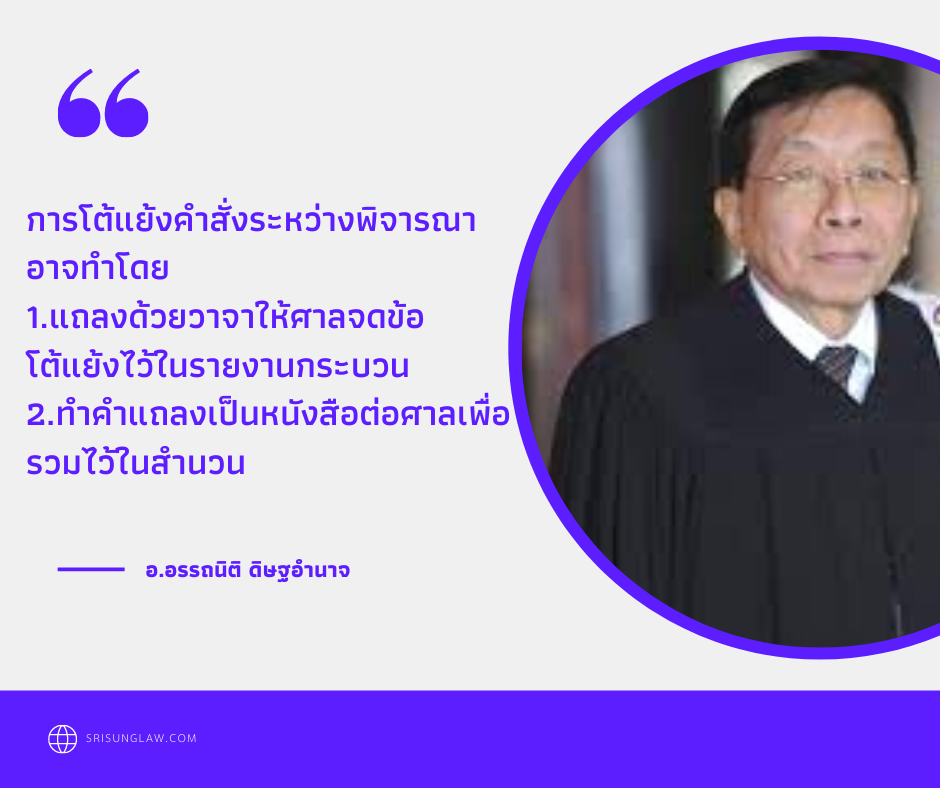
การโต้แย้งคำสั่งระหว่างพิจารณา ต้องทำตอนไหน ?
การโต้แย้งคำสั่งระหว่างพิจารณานั้น กฎหมายไม่ได้วางหลักว่าจะต้องยื่นภายในกำหนดระยะเวลาเท่าไหร่
โดยหลักแล้วการยื่นนั้นไปยื่นเวลาไหนก็ได้แต่ต้อง ยื่นภายหลังศาลมีคำสั่งและก่อนศาลชั้นต้นมีคำพิพากษา หากศาลชั้นต้นมีคำพิพากษาแล้วจะมายื่นโต้แย้งคัดค้านในภายหลังไม่ได้
อย่างไรก็ตามการยื่นคำร้องโต้แย้งไว้ก่อนที่ศาลจะมีคำสั่งไม่ถือว่าเป็นการโต้แย้งคำสั่งระหว่างพิจารณาแต่อย่างใด
ดังนั้นการยื่นคำคัดค้านต่างๆก่อนที่ศาลจะมีคำสั่งจึงไม่ถือว่าเป็นการโต้แย้งคำสั่งระหว่างพิจารณาแต่อย่างใด เป็นแต่เพียงการแถลงคัดค้าน เพื่อประกอบการใช้ดุลพินิจของศาลก่อนมีคำสั่งเท่านั้น
หากศาลมีคำสั่งเป็นอย่างไร ก็จะต้องโต้แย้งคัดค้าน อีกครั้งหนึ่ง จะถือว่าการที่คัดค้านก่อนศาลมีคำสั่งเป็นการโต้แย้งคัดค้านคำสั่งระหว่างพิจารณาไม่ได้ ทั้งนี้ตามนัยคำพิพากษาศาลฎีกา เช่น ฎ.819/2501 , ฎ.1730/2515 , ฎ.2347/2531
อย่างไรก็ตามจะมีบางครั้งบางกรณี ที่ศาลมีคำสั่งระหว่างพิจารณาและก็มีคำพิพากษาตามมาเลย โดยไม่มีเวลาให้เราได้โต้แย้งคัดค้านหรือทำคำร้องโต้แย้งคัดค้าน
ซึ่งในกรณีเช่นนี้เราสามารถอุทธรณ์คำพิพากษาได้โดยที่ไม่ต้องโต้แย้งคัดค้านแต่อย่างใด เพราะถือว่าศาลไม่ได้มีระยะเวลาเพียงพอให้เราโต้แย้งคัดค้านได้ตามสมควร ฎ.1337/2500
นอกจากนี้หากเราไม่ได้โต้แย้งคำสั่งระหว่างพิจารณามาตั้งแต่ต้น และยอมรับปฏิบัติตามคำสั่งระหว่างพิจารณาดังกล่าว และภายหลังเพิ่งจะมาโต้แย้งคัดค้าน ก็อาจจะทำให้ไม่ค่อยมีน้ำหนัก และอาจจะถือว่ายกมาเป็นข้อคัดค้านในภายหลังไม่ได้
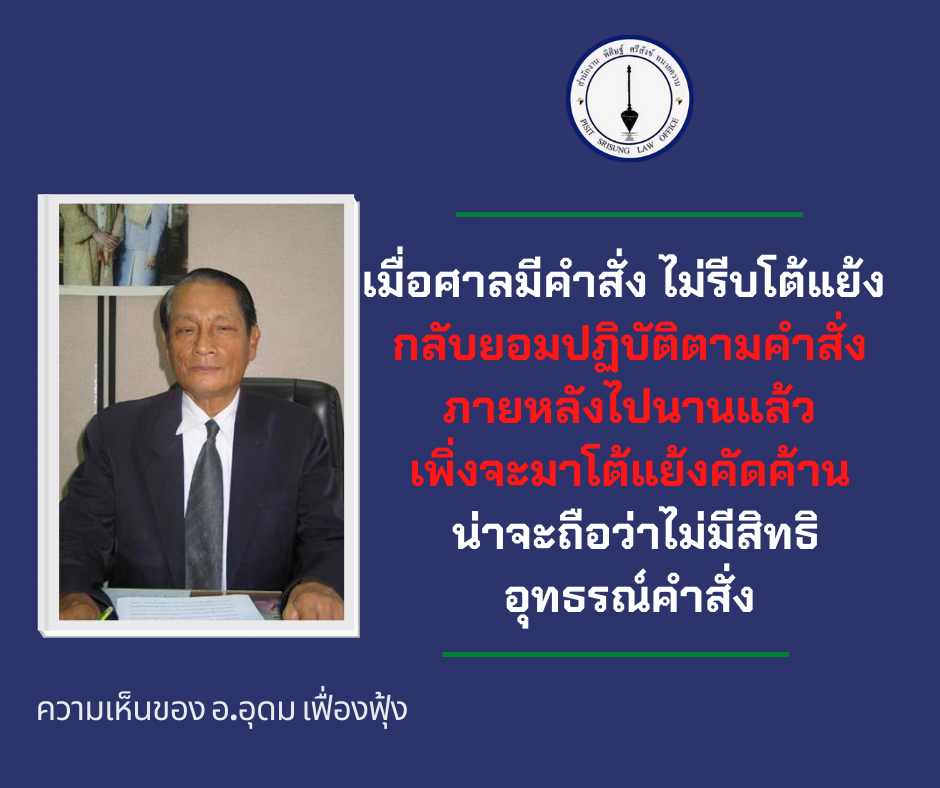
ดังนั้นการยื่นโต้แย้งคำสั่งระหว่างพิจารณา เมื่อศาลมีคำสั่งใดๆแล้วเราไม่เห็นด้วย ก็ควรจะยื่นโต้แย้งให้เร็วที่สุด และไม่ควรดำเนินกระบวนพิจารณาใดๆไปในทางยอมรับหรือยอมปฏิบัติตามคำสั่งดังกล่าว ก่อนที่จะมีการโต้แย้ง
ถ้าหากเรายื่นโต้แย้งโดยเเร็วบางครั้งสถานการณ์สามารถแก้ไขได้โดยง่าย ศาลก็อาจจะมีคำสั่งเพิกถอนกระบวนพิจารณาที่ผิดระเบียบภายในคราวเดียวเลยก็ได้
สรุปแล้ว การยื่นก็คือต้องเป็นการยื่นภายหลังจากศาลมีคำสั่ง และก่อนศาลมีคำพิพากษาวินิจฉัยชี้ขาดเนื้อหาประเด็นแห่งคดี และไม่ควรดำเนินกระบวนพิจารณาใดๆไปในทางยอมรับหรือปฏิบัติตามคำสั่ง ก่อนที่จะมีการโต้แย้งคำสั่งระหว่างพิจารณาดังกล่าว
หลักการทำ คำร้องโต้แย้งคำสั่งระหว่างพิจารณา
การทำคำร้องโต้แย้งคำสั่งระหว่างพิจารณาของศาลนั้น กฎหมายไม่ได้วางหลักเกณฑ์ไว้ว่าเนื้อหาจะต้องเป็นอย่างไร
แต่จากประสบการณ์ของผม และคำอธิบายกฎหมายของอาจารย์ผู้ทรงคุณวุฒิหลายท่าน ประกอบกับคำพิพากษาของศาลฎีกา
ผมสามารถสรุปวิธีการทำคำร้องโต้แย้งคำสั่งระหว่างพิจารณาได้ดังนี้
1.จะต้องอธิบายให้ชัดเจนว่าคำสั่งที่เราต้องการโต้แย้งคืออะไร
วัตถุประสงค์ของการทำคำร้องโต้แย้งคำสั่งระหว่างพิจารณา ก็เพื่อให้เรามีสิทธิ์ยื่นอุทธรณ์คัดค้านคำสั่งระหว่างพิจารณาดังกล่าวได้ภายหลัง
ดังนั้นเราจะโต้แย้งคำสั่งใดของศาล เราก็จะต้องเขียนบรรยายให้ชัดเจนว่าคำสั่งที่เราต้องการโต้แย้งคือคำสั่งอะไร
การบรรยายคำร้องส่วนนี้ เราก็ควรระบุไปเลยว่า ในคดีนี้ศาลมีคำสั่งว่าอะไร /เรายื่นคำร้องว่าอะไร/ เมื่อวันที่เท่าไหร่
ตัวอย่างเช่น
- คดีนี้ศาลที่เคารพโปรดมีคำสั่งอนุญาตให้โจทก์ได้รับยกเว้นค่าธรรมเนียมศาลทั้งหมด เมื่อวันที่ 1 กุมภาพันธ์ 2565
- คดีนี้ศาลที่เคารพโปรดมีคำสั่งไม่อนุญาตให้จำเลยยื่นบัญชีระบุพยานเพิ่มเติมตามคำร้องขอยื่นบัญชีระบุพยานเพิ่มเติมลงวันที่ 1 มีนาคม 2565 โดยให้เหตุผลว่าพยานที่เพิ่มเติมเข้ามาไม่เกี่ยวข้องกับคดี
- คดีนี้ศาลที่เคารพโปรดยกคำร้องขอหมายเรียกพยานเอกสารของจำเลย ฉบับลงวันที่ 1 มกราคม 2565 โดยให้เหตุผลว่าพยานเอกสารดังกล่าวไม่เกี่ยวข้องกับคดี
2.สาเหตุที่ไม่เห็นด้วยกับคำสั่ง จะระบุไว้หรือไม่ระบุไว้ก็ได้
เมื่อเราระบุไว้ในข้อแรกแล้วว่า เราไม่เห็นด้วยกับคำสั่งระหว่างพิจารณาอะไร ส่วน สาเหตุที่เราไม่เห็นด้วยนั้นเราจะระบุไว้ในคำร้องเลยหรือจะไม่ระบุก็ได้
เพราะตามแนวคำพิพากษาของศาลฎีกา การโต้แย้งคำสั่งระหว่างพิจารณาไม่จำเป็นต้องให้เหตุผลของการที่ไม่เห็นด้วยกับคำสั่งของศาลชั้นต้นแต่อย่างใด
ดังนั้นเราจึงอาจจะระบุสั้นๆเพียงว่า ผู้ร้องไม่เห็นด้วยกับคำสั่งดังกล่าวของศาลชั้นต้นจึงขอคัดค้านไว้เพื่อใช้สิทธิ์ในการอุทธรณ์ฎีกาต่อไป ก็สามารถทำได้
ทั้งนี้ตามตัวอย่างคำพิพากษาศาลฎีกา เช่น ฎ.1532/2525 , ฎ.2802/2519 , ฎ.235-241/2517 , ฎ.1730/2515 , ฎ.4581/2548 , ฎ.4581/2548
แต่อย่างไรก็ตามสำหรับผมแล้วเห็นว่า ควรจะระบุเหตุผลที่ไม่เห็นด้วยกับคำสั่งของศาลชั้นต้นไปด้วย
เพราะจะมีประโยชน์หลายประการ เพราะหากศาลคนเดิมหรือผู้พิพากษาคนใหม่ที่มานั่งพิจารณาคดีนั้นได้อ่านเนื้อหาคำร้องของเราซึ่งประกอบด้วยเหตุผลอันดีแล้ว
ศาลอาจจะเห็นพ้องกับ เหตุผลของเราและมีคำสั่งเพิกถอนคำสั่งของตนเองและมีคำสั่งใหม่ตามรูปคดี ก็เป็นไปได้
ตัวอย่างเช่น
- ผู้ร้องไม่เห็นพ้องด้วยกับคำสั่งของศาลชั้นต้นที่อนุญาตให้โจทก์ยกเว้นค่าธรรมเนียมศาลทั้งหมด เนื่องจากในทางไต่สวนคำร้องขอยกเว้นค่าธรรมเนียมศาล ข้อเท็จจริงปรากฏอย่างชัดเจนว่าโจทก์ยังมีทรัพย์สินอย่างอื่นที่เพียงพอใช้สำหรับการชำระค่าธรรมเนียมศาลได้โดยไม่เดือดร้อน
- ผู้ร้องไม่เห็นพ้องด้วยกับคำสั่งที่ไม่อนุญาตให้จำเลยยื่นบัญชีระบุพยานเพิ่มเติม เนื่องจากพยานเอกสารตามบัญชีระบุพยานเพิ่มเติมดังกล่าว มีความเกี่ยวเนื่องและเป็นประเด็นข้อสำคัญกับคดี ซึ่งรายละเอียดจะปรากฏชัดเจนในชั้นสืบพยาน
- ผู้ร้องไม่เห็นพ้องด้วยกับการที่ศาลชั้นต้นยกคำร้องขอหมายเรียกพยานเอกสารของจำเลย เนื่องจากพยานเอกสารดังกล่าวเป็นพยานที่สำคัญในคดีนี้ที่จะชี้ขาดประเด็นข้อพิพาทในคดีให้เป็นไปอย่างเที่ยงธรรม และจำเลยไม่มีทางที่จะเอาเอกสารดังกล่าวมาศาลได้ด้วยตนเอง
3.ระบุว่าต้องการอุทธรณ์คัดค้านคำสั่งดังกล่าว เมื่อศาลมีคำพิพากษาต่อไป
เมื่อเราบรรยายถึงคำสั่งที่ต้องการโต้แย้ง และสาเหตุที่ไม่เห็นด้วยแล้ว ในขั้นตอนสุดท้ายเราจะต้องบรรยายไว้ด้วยว่า จากสาเหตุดังกล่าวทั้งหมดเราจึงมีความประสงค์จะคัดค้านคำสั่งระหว่างพิจารณาดังกล่าวของศาลชั้นต้น เพื่อใช้สิทธิ์ในการอุทธรณ์ฎีกาต่อไป
ตัวอย่างเช่น
ด้วยเหตุดังประจำเลยประทานกราบเรียนต่อศาลที่เคารพ จำเลยจึงขอโต้แย้งคัดค้านคำสั่งระหว่างพิจารณาดังกล่าว เพื่อใช้สิทธิ์ในการยื่นอุทธรณ์ฎีกาภายหลังเมื่อศาลชั้นต้นมีคำพิพากษาต่อไป
4.จะต้องเขียนอย่างสุภาพ อย่าใส่อารมณ์ หรือดูหมิ่นศาล
แน่นอนว่าด้วยเนื้อหาของการทำคำร้องโต้แย้งคำสั่งระหว่างพิจารณา คือการที่เราโต้แย้งหรือไม่เห็นด้วยกับคำสั่งต่างๆของศาล ดังนั้นการเขียนย่อมจะต้องเป็นการบรรยายในเชิงชี้ให้เห็นว่า คำสั่งของศาลชั้นต้นไม่ชอบด้วยข้อกฎหมาย หรือไม่ชอบด้วยข้อเท็จจริงอย่างไร มีความคลาดเคลื่อนอย่างไร
อย่างไรก็ตามเราควรจะตระหนักไว้ว่า ไม่ควรจะใส่อารมณ์ หรือใช้ถ้อยคำที่รุนแรงในการเขียนคำร้องโต้แย้งคำสั่งระหว่างพิจารณา เพราะนอกจากจะไม่เกิดประโยชน์ใดๆแล้ว ยังอาจจะทำให้ศาลสูงมองเราในแง่ที่ไม่ดี หรืออาจจะทำให้เรามีความผิดฐานดูหมิ่นศาลได้
การโต้แย้งควรจะทำด้วยความสุภาพ ด้วยเหตุผล และด้วยความนุ่มนวลอย่างเช่นปัญญาชนครับ
ตัวอย่างคำร้องขอโต้แย้งคำสั่งระหว่างพิจารณา
ตัวอย่างแรก
คดีนี้ระหว่างการสืบพยานผมได้อ้างส่งเอกสารหลักฐานหลายฉบับ แต่ปรากฏว่าศาลชั้นต้นไม่ยอมรับเข้าสู่จำนวนโดยอ้างว่าไม่เกี่ยวข้องกับประเด็นคดี ผมจึงได้ทำคำร้องโต้แย้งคัดค้านพร้อมกับอ้างเอกสารดังกล่าวไว้ท้ายคำร้อง
ข้อ 1. คดีนี้ศาลที่เคารพโปรดนัดฟังจะพิพากษาในวันที่ 26 ตุลาคม 2559
ข้อ 2. เนื่องจากในวันนัดสืบพยานจำเลย ในวันที่ 7 ตุลาคม 2559 เวลา 9.00 นาฬิกา นาง………จำเลยได้อ้างตนเองเป็นพยาน และเบิกความอ้างส่งเอกสารจำนวนหลายฉบับซึ่งเกี่ยวข้องกับคดีนี้และได้ยื่นบัญชีระบุพยานต่อศาลไว้แล้วแต่ปรากฏว่าศาลที่เคารพเห็นว่าพยานเอกสารดังกล่าวมิได้เกี่ยวข้องกับประเด็นแห่งคดีจึงไม่ได้นำไปรวมเข้าสำนวนไว้
ซึ่งเอกสารดังกล่าวได้แก่
1สำเนาที่ดินโฉนดเลขที่ 9 ตำบลหนองรี อำเภอเมือง จังหวัดชลบุรี
2.รายการรังวัดที่ดินโฉนดเลขที่ 9 ตำบลหนองรีอำเภอเมืองจังหวัดชลบุรี
3.หนังสือแจ้งเรื่องการระวังชี้แนวเขตและลงชื่อรับรองเขตที่ดินฉบับลงวันที่ 13 ธันวาคม 2519
4.รายชื่อและที่อยู่ของเจ้าของที่ดินแปลงข้างเคียงที่ดินโฉนดเลขที่ 9 ตำบลหนองรี อำเภอเมืองจังหวัดชลบุรี
5.รายงานการรังวัดที่ดินฉบับลงวันที่ 25 เมษายน 2555
รายละเอียดตามเอกสารที่แนบท้ายคำร้องฉบับนี้
ข้อ 3.ผู้ร้องขอประทานกราบเรียนต่อศาลที่เคารพว่าเอกสารดังกล่าวเป็นพยานเอกสารสำคัญในคดีนี้และในความเกี่ยวข้องในประเด็นข้อพิพาท จึงขอยื่นคำร้องนี้ไว้เพื่อเป็นการโต้แย้งคำสั่งของศาลชั้นต้นและเพื่อใช้สิทธิ์อุทธรณ์ต่อไป
ควรมิควรแล้วแต่จะโปรด
ตัวอย่างที่สอง
เป็นคดีพิพาทเกี่ยวกับที่ดิน ผมยื่นคำร้องขอให้รังวัดสอบเขตทำแผนที่พิพาทไว้แต่ศาลยกคำร้อง ผมจึงทำคำร้องโต้แย้งคำสั่งระหว่างพิจารณาของศาลไว้
ข้อ1. คดีนี้ศาลที่เคารพก่อนนัดสืบพยานโจทก์และจำเลยในวันที่ 27-28 เมษายน 2565
ข้อ 2.เนื่องจากทนายความโจทก์ได้ยื่นคำร้องขอให้ศาลมีคำสั่งรังวัดสอบเขตทำแผนที่พิพาทไว้ต่อศาลเมื่อวันที่ 14 กันยายน 2564 ซึ่งศาลได้มีคำสั่งยกคำร้องดังกล่าวเนื่องจากให้เหตุผลว่าคดีนี้ไม่ได้มีประเด็นเรื่องความกว้างความยาวของทางพิพาท จึงไม่มีเหตุที่จะขอให้ศาลมีคำสั่งจัดทำแผนที่พิพาทตามที่โจทก์ขอ
ข้อ 3.ด้วยความเคารพต่อคำสั่งของศาลชั้นต้น เนื่องจากคำสั่งดังกล่าวเป็นคำสั่งระหว่างพิจารณาและทนายความโจทก์ไม่อาจเห็นพ้องด้วยกับคำสั่งดังกล่าว เนื่องจากคดีนี้มีความจำเป็นที่จะต้องพิจารณาว่า ทางพิพาทและทางสาธารณะมีความกว้างยาวเท่าไหร่ซึ่งเป็นประเด็นข้อสำคัญในคดี
ดังนั้น ทนายความโจทก์จึงขอโต้แย้งคัดค้านคำสั่งที่ไม่อนุญาตให้รังวัดทำแผนที่พิพาทดังกล่าวเพื่อใช้สิทธิ์ในการอุทธรณ์ภายหลังเมื่อศาลชั้นต้นมีคำพิพากษาต่อไป
ควรมิควรแล้วแต่จะโปรด
ตัวอย่างที่สาม
ขอเพิกถอนกระบวนพิจารณาที่ผิดระเบียบ และคำร้องโต้แย้งคำสั่งระหว่างพิจารณา ไปพร้อมคำร้องฉบับเดียวกัน
คดีนี้ผมส่งเสมียนทนายความไปเลื่อนคดี แล้วปรากฏว่าศาลไม่ได้สั่งคำร้องขอเลื่อนคดีของผมแต่กลับทำการชี้สองสถานและกำหนดวันนัดสืบพยานไปลับหลังผม
ช้อ 1.คดีนี้ศาลนัดไกล่เกลี่ยและชี้สองสถานเมื่อวานนี้คือวันที่ 18 ตุลาคม 2564 โดยทนายความจำเลยขอเลื่อนคดีเนื่องจากติดว่าความอยู่ที่ศาลอื่น รายละเอียดปรากฏตามคำร้องขอเลื่อนคดีของทนายความจำเลยแล้วนั้น
ปรากฏว่าศาลไม่อนุญาตให้จำเลยเลื่อนคดี โดยให้เหตุผลว่าเนื่องจากวันนี้เป็นเพียงวันไกล่เกลี่ยชี้สองสถานจึงไม่อนุญาตให้เลื่อนคดี และได้ทำการชี้สองสถานลับหลังจำเลยและทนายความจำเลย รวมทั้งได้กำหนดประเด็นข้อพิพาทต่างๆ โดยไม่ได้มีตัวจำเลยและทนายความจำเลยเข้าร่วมด้วย
ข้อ2.จำเลยขอชี้แจงว่ากระบวนพิจารณาเมื่อวานนี้คือวันที่ 18 ตุลาคม 2564 เป็นกระบวนพิจารณาที่ผิดระเบียบดังต่อไปนี้
2.1คดีนี้เป็นคดีครอบครัวที่มีข้อพิพาทดังนั้นก่อนเริ่มพิจารณาศาลจะต้องตั้งผู้ประนีประนอมคดีครอบครัวเพื่อไกล่เกลี่ยให้คู่ความในคดีครอบครัวและประนีประนอมกัน ก่อนดำเนินกระบวนการพิจารณาและสืบพยาน ตามหลักเกณฑ์และวิธีการและตามข้อบังคับของประธานศาลฎีกา ตาม พ.ร.บ.จัดตั้งศาลเยาวชนและครอบครัวมาตรา 148 แต่ปรากฏว่าคดีนี้ศาลได้ชี้สองสถานและกำหนดวันนัดสืบพยานไปโดยไม่ทำการตั้งผู้ประนีประนอมและให้ทั้งสองฝ่ายได้เจรตกลงกันได้ก่อน จึงเป็นกระบวนพิจารณาที่ผิดระเบียบ
ซึ่งที่ผ่านมาในคดีครอบครัวที่มีข้อพิพาท ในลักษณะเช่นนี้ ที่ศาลได้กำหนดวันชี้สองสถานและสืบพยานไปโดยที่ไม่ได้กำหนดให้มีการตั้งผู้ประนีประนอมคดีครอบครัวเพื่อทำการไกล่เกลี่ยกันก่อน จำเลยก็เข้าใจว่าคดีต่างๆเหล่านั้นได้ถูกศาลสูงพิพากษาย้อนกลับมาให้ดำเนินการตามกฎหมายอยู่หลายคดี เพราะเป็นกระบวนพิจารณาที่ผิดระเบียบ ซึ่งปรากฏอยู่ในสำนวนต่างๆในคดีของศาลเยาวชนและครอบครัวนี้แล้ว
โดยเฉพาะคดีนี้ เป็นคดีเกี่ยวกับครอบครัวที่มีผู้เยาว์มาเกี่ยวข้อง จำเลยประสงค์จะให้การอุปการะเลี้ยงดูบุตรผู้เยาว์ตามสมควรอยู่แล้ว การที่ศาลกำหนดให้สืบพยานต่อสู้คดีกันไปเลย โดยไม่ให้คู่ความทั้งสองฝ่ายมาทำการเจรจาไกล่เกลี่ยกันก่อน ย่อมไม่เกิดประโยชน์สูงสุดแก่ผู้เยาว์
2.2.การที่นัดนี้เป็นนัดไกล่เกลี่ยและนัดชี้สองสถาน ถือว่าเป็นนัดสำคัญตามกฎหมายที่จำเลยและทนายความจำเลยควรจะมีสิทธิ มาโต้แย้ง หรือใช้สิทธิ์ในการชี้แจงข้อเท็จจริงของฝ่ายตนเองในการกำหนดชี้สองสถาน
ที่ศาลนี้ไม่ให้เลื่อนคดี โดยให้เหตุผลเพียงว่าเพราะเป็นเพียงนัดไกล่เกลี่ยหรือชี้สองสถาน ทั้งที่ไม่ว่าจะเป็นการไกล่เกลี่ยหรือการชี้สองสถานก็ตามล้วนแต่เป็นกำหนดนัดที่สำคัญ ที่จำเลยควรจะมีทนายความจำเลยเข้ามาให้คำปรึกษาและดำเนินกระบวนพิจารณา คำสั่งดังกล่าวจึงเป็นการสั่งไม่อนุญาตให้เลื่อนคดีโดย ขัดต่อหลักประมวลกฎหมายวิธีพิจารณาความแพ่งมาตรา 40
2.3 การทำการชี้สองสถานลับหลังจำเลยและทนายความจำเลย โดยที่ฝ่ายจำเลยส่งเพียงเสมียนทนายความ เข้ามาขอเลื่อนคดีโดยไม่ได้ให้อำนาจในการชี้สองสถานด้วย เป็นคำสั่งและกระบวนพิจารณา ที่ไม่ชอบด้วยกฎหมายตามประมวลกฎหมายวิธีพิจารณาความแพ่งมาตรา 183 เนื่องจากการชี้สองสถานนั้นคู่ความทุกฝ่ายจะต้องมาศาล และศาลจะต้องสอบถามคู่ความทุกฝ่ายถึงข้ออ้างและข้อเถียงต่างๆ ตามที่กำหนดไว้ในกฎหมาย
การที่ศาลชี้สองสถานโดยมีเพียงตัวโจทก์กับทนายความโจทก์เพียงฝ่ายเดียว ทำให้จำเลยเสียเปรียบเป็นอย่างยิ่งและเป็นกระบวนพิจารณาที่ไม่ชอบด้วยกฎหมาย ซึ่งทำให้การชี้สองสถานดังกล่าวไม่ถูกต้องตามกฎหมายไปด้วย
ข้อ 3.ด้วยเหตุดังทนายความจำเลยประทานกราบเรียนต่อศาลที่เคารพจึงขอศาลที่เคารพ จึงขอศาลที่เคารพโปรดมีคำสั่งเพิกถอนกระบวนพิจารณาที่ผิดระเบียบตั้งแต่การไม่อนุญาตให้ทนายความจำเลยเลื่อนคดีและการชี้สองสถานที่ไม่ถูกต้องตามกฎหมายและการกำหนดวันนัดสืบพยานโดยไม่ถูกต้องตามกฎหมาย
และหากศาลไม่อนุญาตให้เพิกถอนกระบวนพิจารณาที่ผิดระเบียบก็ให้ถือเอาตามคำร้องฉบับนี้เป็นการโต้แย้งคำสั่งระหว่างพิจารณาเพื่อที่ทนายความจำเลยจะใช้สิทธิ์อุทธรณ์ฎีกาต่อไป
และหากศาลมีคำพิพากษาอย่างใด ทนายความใช้สิทธิอุทธรณ์คำพิพากษารวมทั้งคำสั่งระหว่างพิจารณาต่อไป
ควรมิควรแล้วแต่จะโปรด
ตำราอ้างอิงประกอบการเขียนบทความ / สำหรับค้นคว้าเพิ่มเติม
บทความนี้ผมกลั่นกรองจากประสบการณ์การทำงานของผม ประกอบกับตำราของอาจารย์ผู้ทรงคุณวุฒิหลายท่าน ตามรายชื่อด้านล่างนี้ ผู้สนใจสามารถศึกษาค้นคว้าเพิ่มเติมได้
- คำอธิบายกฎหมายวิธีพิจารณาความแพ่งภาค 3 ปิติกุล จิระมงคลพาณิชย์
- คำอธิบายประมวลกฎหมายวิธีพิจารณาความแพ่งภาค 3 อุทธรณ์ ฎีกา อุดม เฟื่องฟุ้ง
- คำอธิบายกฎหมายวิธีพิจารณาความแพ่งภาค 3 อุทธรณ์ฎีกา ศาสตราจารย์พิเศษ ไพโรจน์ วายุภาพ
- คำอธิบายกฎหมายวิธีพิจารณาความแพ่ง 1รองศาสตราจารย์วินัย ล้ำเลิศ
- คำอธิบายประมวลกฎหมายวิธีพิจารณาความแพ่ง นายธานินทร์ กรัยวิเชียร
- คำอธิบายประมวลกฎหมายวิธีพิจารณาความแพ่ง รองศาสตราจารย์จักรพงษ์ เล็กสกุลไชย
- คำอธิบายกฎหมายวิธีพิจารณาความแพ่งภาค 1 บททั่วไป ศาสตราจารย์พิเศษ ไพโรจน์ วายุภาพ
- คำอธิบายประมวลกฎหมายวิธีพิจารณาความแพ่ง ภาค 1 ตอน 1 อุดม เฟื่องฟุ้ง
- กฎหมายวิธีพิจารณาความแพ่งว่าด้วยอุทธรณ์ฎีกา จรัญ ภักดีธนากุล
- คำอธิบายประมวลกฎหมายวิธีพิจารณาความแพ่งภาค 3 อุทธรณ์และฎีกา ศาสตราจารย์พิเศษ อรรถนิติ ดิษฐอำนาจ
- คำอธิบายประมวลกฎหมายวิธีพิจารณาความอาญา ภาพ 3-4 ศาสตราจารย์พิเศษธาณิศ เกศวพิทักษ์
สุดท้ายนี้ผมหวังว่า คำอธิบายข้อกฎหมาย ที่เกิดจากประสบการณ์การทำงานจริง และเน้นเพื่อการปรับใช้งานในทางปฏิบัติ และเป็นคู่มือการปฏิบัติงานเช่นนี้ จะเกิดประโยชน์แก่ผู้อ่านครับ

 51/29-51-30 หมู่ 4 ต.บ้านสวน อ.เมือง จ.ชลบุรี
51/29-51-30 หมู่ 4 ต.บ้านสวน อ.เมือง จ.ชลบุรี


